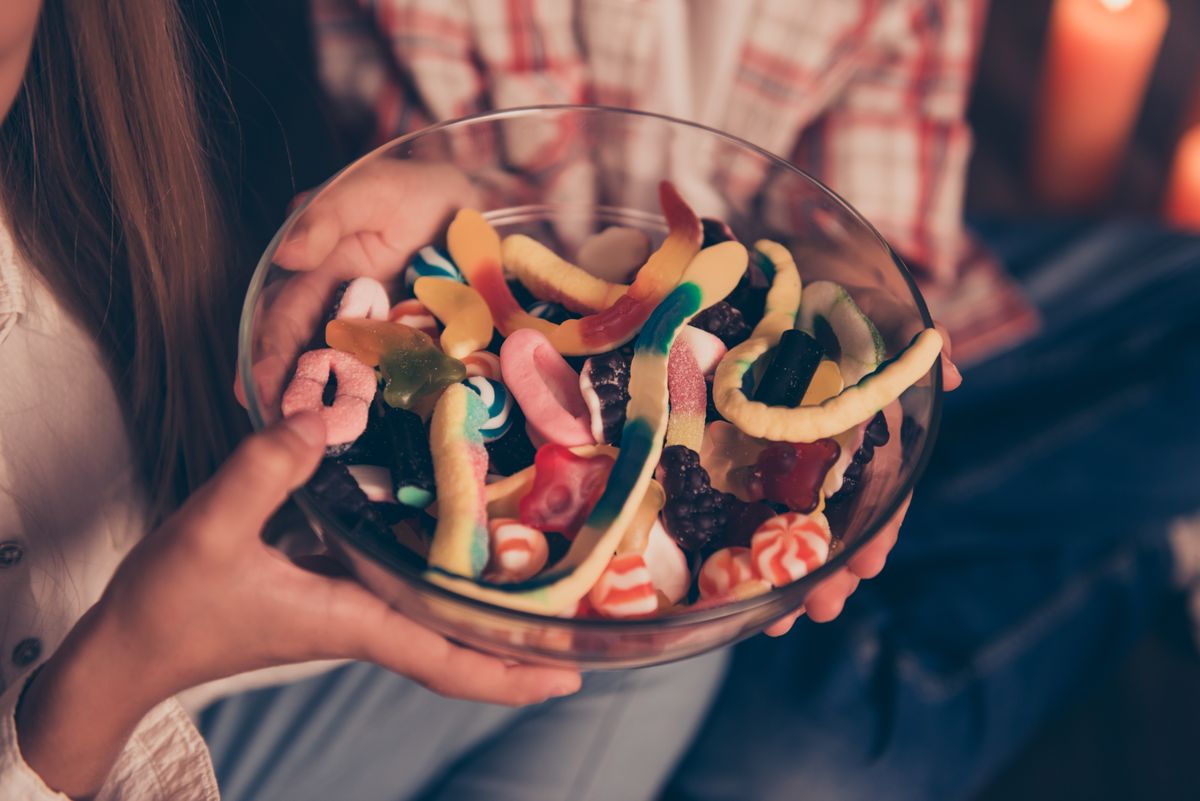Stress is an unavoidable part of life and can stem from a variety of sources, such as work, finances, and even national events. The American Psychological Association reports that 77% of Americans feel stressed about the future of the nation. Unfortunately, stress can also lead to weight gain due to the release of cortisol and adrenaline hormones by the adrenal glands.
High levels of cortisol negatively impact sugar metabolism and lead to energy storage as fat around the midsection, according to endocrinologist Florence Comite, MD, founder of Comite Centers for Precision Medicine & Health.
Overeating is another way that stress can lead to weight gain. Under chronic stress, individuals often crave comfort foods, particularly high-carbohydrate options that provide temporary relief. However, certain foods can exacerbate stress feelings, causing binge eating episodes due to the drastic rise in cortisol levels and insulin when consuming them.
Sports medicine physician and surgeon Kellie K. Middleton, MD, MPH, warns that the worst stress-inducing foods can lead to weight gain as the body struggles to regulate its blood sugar levels after consuming sugary or processed snacks.
Here are some of the top stress-inducing foods that can lead to stress-triggered weight gain and abdominal fat. To prevent stress-triggered weight gain, consider incorporating healthy eating habits, such as the 6 Best Foods To Avoid Stress-Triggered Weight Gain, as recommended by dietitians.
1) Croissants & Muffins

It's surprising to know that delectable pastries, such as flaky croissants and sugar-topped muffins, can elicit the same hormonal response as a demanding boss. But it's true, as these foods can cause or worsen stress, leading to a surge in cortisol levels.
According to Dr. Middleton, these foods are rich in sugar, fat, and refined carbohydrates, making them "trigger foods" that elicit the release of insulin, along with cortisol. Insulin signals the brain to crave more sugar or energy, perpetuating a cycle of stress and sugar cravings.
To avoid the hormonal response caused by these "trigger foods," consider choosing healthier alternatives with lower sugar, fat, and refined carbohydrates content. This way, you can still enjoy tasty treats without disrupting your body's hormonal balance.
2) Coffee

If you're trying to avoid stress-induced weight gain, you may want to think twice about drinking coffee in the morning. Cortisol levels in the body naturally rise and fall throughout the day in sync with the circadian clock, a hormonal cycle that regulates the body's rhythms. Research suggests that cortisol levels peak between 6 a.m. and 10 a.m. to help you wake up.
However, caffeine can cause the production of more cortisol, leading to a morning jolt that hits right when your body's cortisol is already at its peak. While a cup of coffee at any time of day can stimulate the release of stress hormones, it may be particularly problematic in the morning.
According to Barbara Kovalenko, RD, and nutrition consultant at Lasta, caffeine-induced stress can lead to cravings for sugar and carbohydrates, exacerbating weight gain. "This can cause feelings of anxiety and stress, leading to further stress-induced weight gain," she says.
If you're a coffee lover and want to avoid stress-induced weight gain, consider having your coffee later in the day, when cortisol levels are naturally lower. Alternatively, you may want to try switching to decaf or another low-caffeine alternative to reduce the impact of caffeine on your body's stress response. Remember, moderation is key when it comes to caffeine intake, and it's always a good idea to consult with a healthcare professional or registered dietitian to determine the best dietary choices for your overall health and well-being.
3) Spaghetti
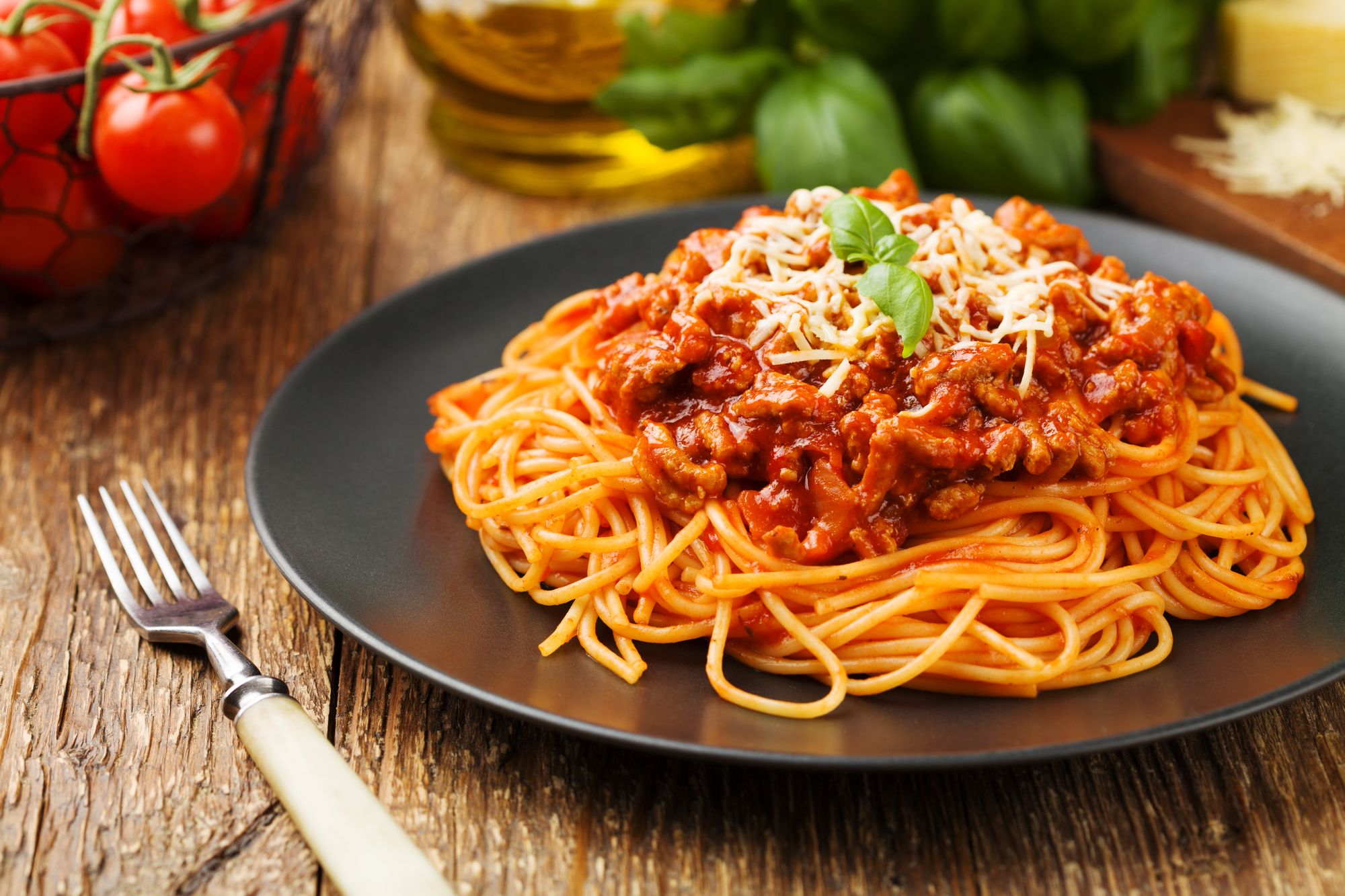
Gluten sensitivity can cause your body to release cortisol, even if you don't have celiac disease. According to Kristina Ford, a board-certified physician's assistant and functional health and nutrition consultant, the low-grade inflammation caused by food sensitivity may gradually raise cortisol levels and keep your body in a state of stress.
While you may not notice the effects of gluten sensitivity like you would with a food allergy, the chronic inflammation can still lead to increased cortisol levels. Cortisol can affect appetite and cravings by binding to specific receptors in the hypothalamus, the ancient part of the brain responsible for regulating hunger hormones and other hormones.
This can lead to an increase in appetite and dysregulation of other hormones, making it more difficult to maintain a healthy weight. Therefore, if you suspect that you have gluten sensitivity, it may be beneficial to consult with a healthcare professional or a registered dietitian to determine the best dietary choices for you. By avoiding gluten-containing foods, you may be able to lower cortisol levels and reduce the risk of stress-induced weight gain.
4) Ultra-processed snacks
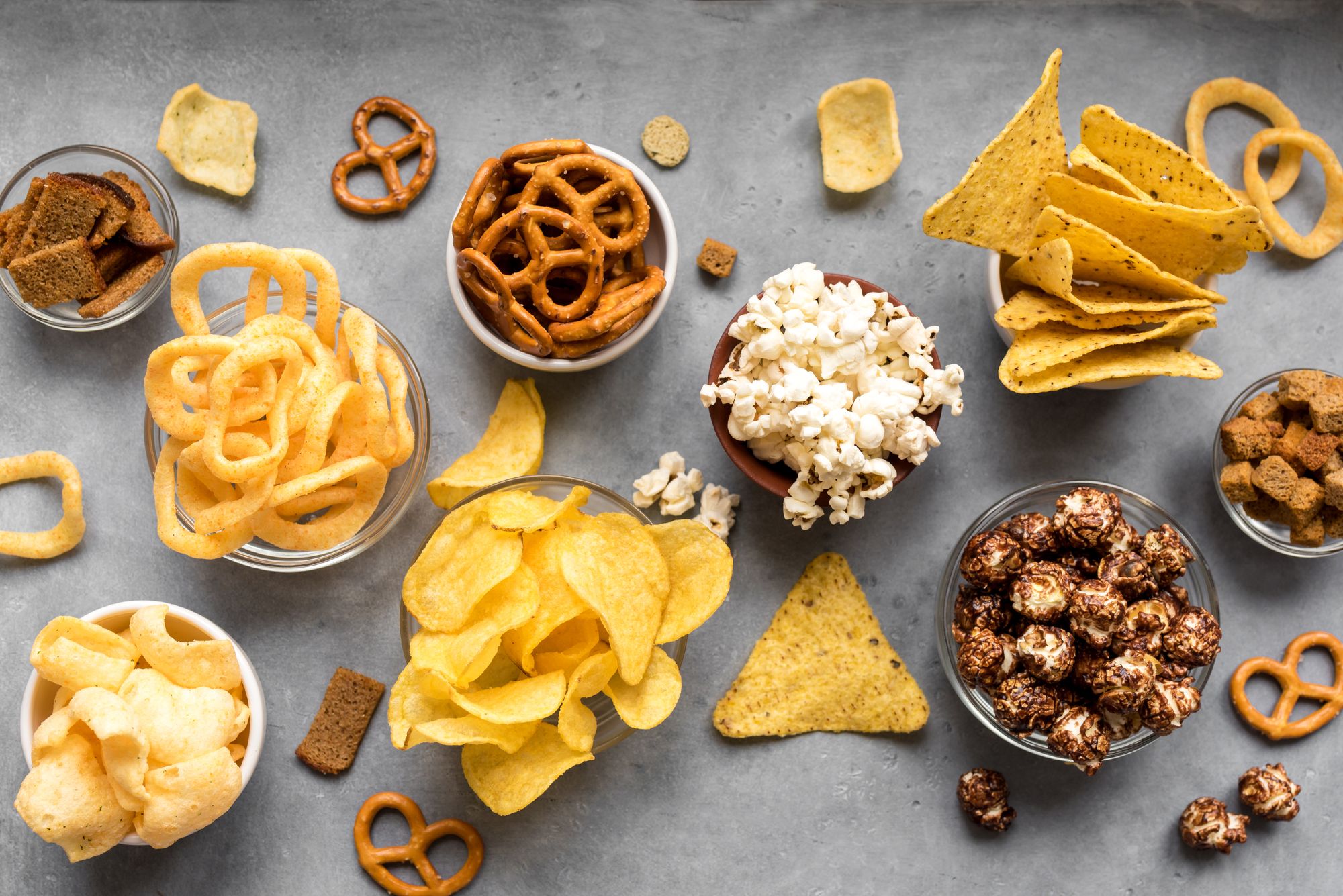
Processed snacks like cookies, pretzels, tortilla chips, and potato chips can contribute to anxiety and psychological stress. According to registered dietitian nutritionist Mary Sabat, MS, RDN, owner of Body Design by Mary, overindulging in these foods can lead to feelings of guilt and shame, which can further increase stress levels.
These highly processed snacks can also be high in sugar, sodium, and unhealthy fats, which can affect blood sugar levels and cause inflammation in the body. This can contribute to a cycle of stress-induced cravings and weight gain.
To avoid stress-induced weight gain, consider swapping out processed snacks for healthier options, such as fresh fruit, vegetables with hummus, or a handful of nuts. By making small changes to your diet, you can improve your overall health and well-being and reduce stress levels in the process.
5) Soda

Soda and sweet iced tea are sugary beverages that can cause a rapid increase in blood sugar levels, followed by a crash, leading to fatigue and irritability - two common symptoms of stress. According to registered dietitian nutritionist Mary Sabat, owner of Body Design by Mary, soda triggers the release of cortisol, a hormone that helps the body cope with stress. High levels of cortisol can lead to fat storage in the abdominal area and cause cravings for more sugary and processed foods.
To avoid stress-induced weight gain, consider swapping sugary drinks for healthier alternatives like water or unsweetened herbal tea. By reducing your intake of sugary beverages, you can improve your overall health, stabilize your blood sugar levels, and reduce the risk of stress-induced weight gain.
6) Alcohol

While having a glass of wine with dinner or while relaxing and watching Netflix may seem like a great way to unwind, researchers have found that alcohol can cause cortisol levels to rise more than they typically would in response to stressful events. In addition to increasing cortisol levels, alcohol can contribute to stress-induced weight gain by disrupting sleep.
According to nutritionist Lisa Richards, author of The Candida Diet, alcohol consumption can interfere with sleep quality, leading to higher cortisol levels and morning cravings for high-carbohydrate and high-fat foods. This cycle of disrupted sleep, increased cortisol levels, and unhealthy food cravings can contribute to weight gain over time.
To avoid stress-induced weight gain from alcohol, consider limiting your intake to moderate levels and avoiding alcohol close to bedtime. By prioritizing quality sleep and making mindful choices about your alcohol consumption, you can improve your overall health and well-being while avoiding stress-induced weight gain.
7) Waffles

Foods like waffles and white bread, which are high in processed carbohydrates, can lead to a rapid spike and subsequent crash in blood sugar levels. This can cause feelings of anxiety, lethargy, and irritability, according to Sony Sherpa, MD, a holistic physician from Nature's Rise. These types of foods can also activate the reward centers in the brain, creating a temporary feeling of pleasure that encourages further consumption.
However, Dr. Sherpa warns that consuming foods lacking sufficient nutrition can trigger stress in both our bodies and brains. Overindulging in highly processed foods can also lead to long-term feelings of guilt and dissatisfaction.
To avoid stress-induced weight gain, consider incorporating healthier carbohydrate options into your diet, such as whole grains, fruits, and vegetables. These foods can provide more sustainable energy and are often rich in essential nutrients that support overall health and well-being. By making these dietary changes, you can reduce stress levels, avoid weight gain, and improve your overall health.
8) Fried Foods
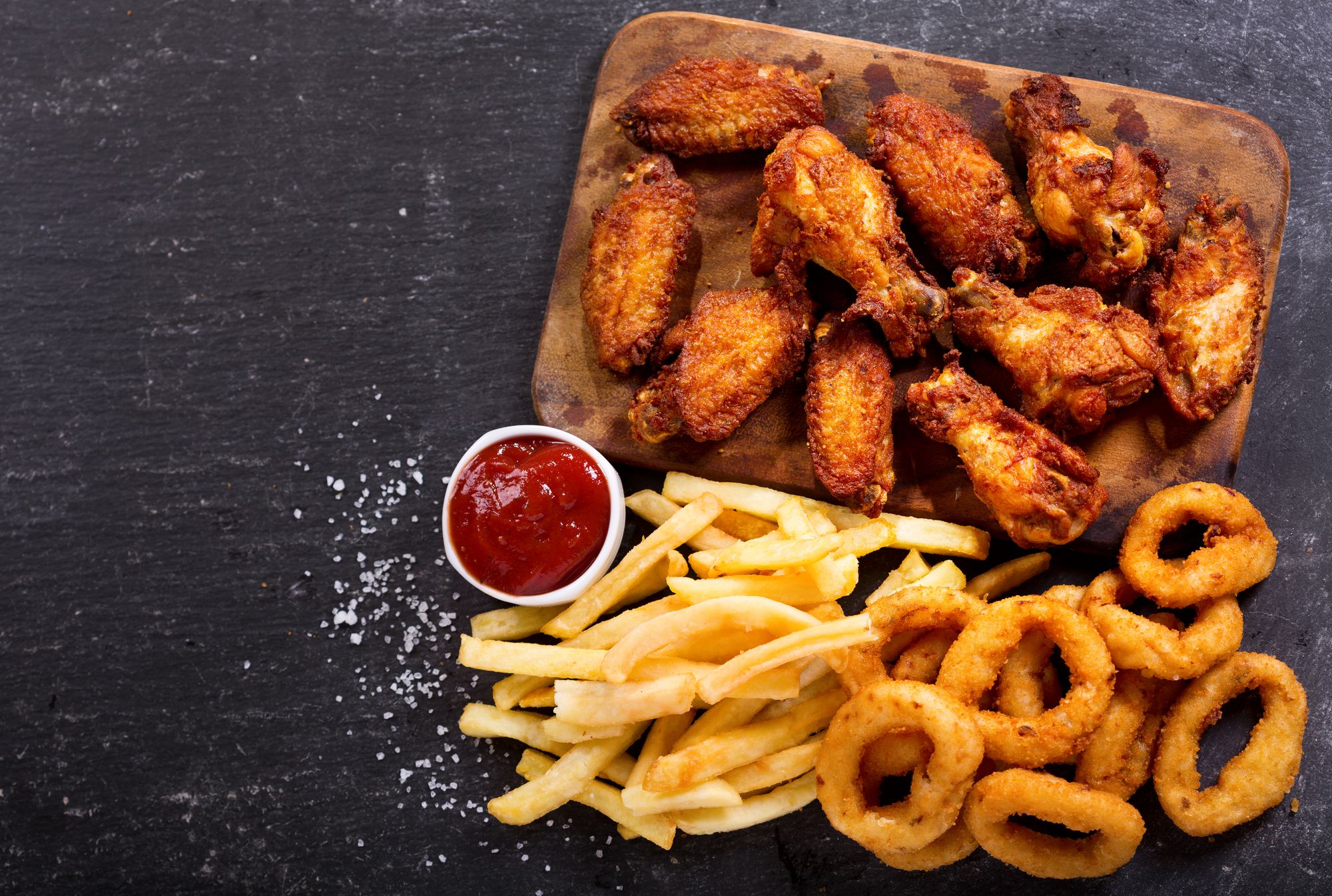
Foods that are deep-fried, such as fried chicken, French fries, battered and fried fish, and mozzarella sticks, can contribute to an increase in stress hormones. According to Kristina Ford, a board-certified physician's assistant and functional health and nutrition consultant, these foods often contain trans fats, which can increase inflammation in the body and lead to an increase in cortisol.
Trans fats are more difficult for the body to break down and use as an immediate fuel source, leading to their storage in the body, which can create additional strain on the body's systems. Industrial trans fatty acids, the worst types of trans fats, are partially hydrogenated vegetable oils that have been linked to cardiovascular disease, according to the journal Advances in Nutrition. These trans fats can still be found in many processed foods and oils used for frying.
To avoid stress-induced weight gain, consider swapping out deep-fried foods for healthier alternatives like baked or grilled options. By reducing your intake of trans fats and inflammation-causing foods, you can reduce your risk of stress-induced weight gain and improve your overall health.
9) Pizza
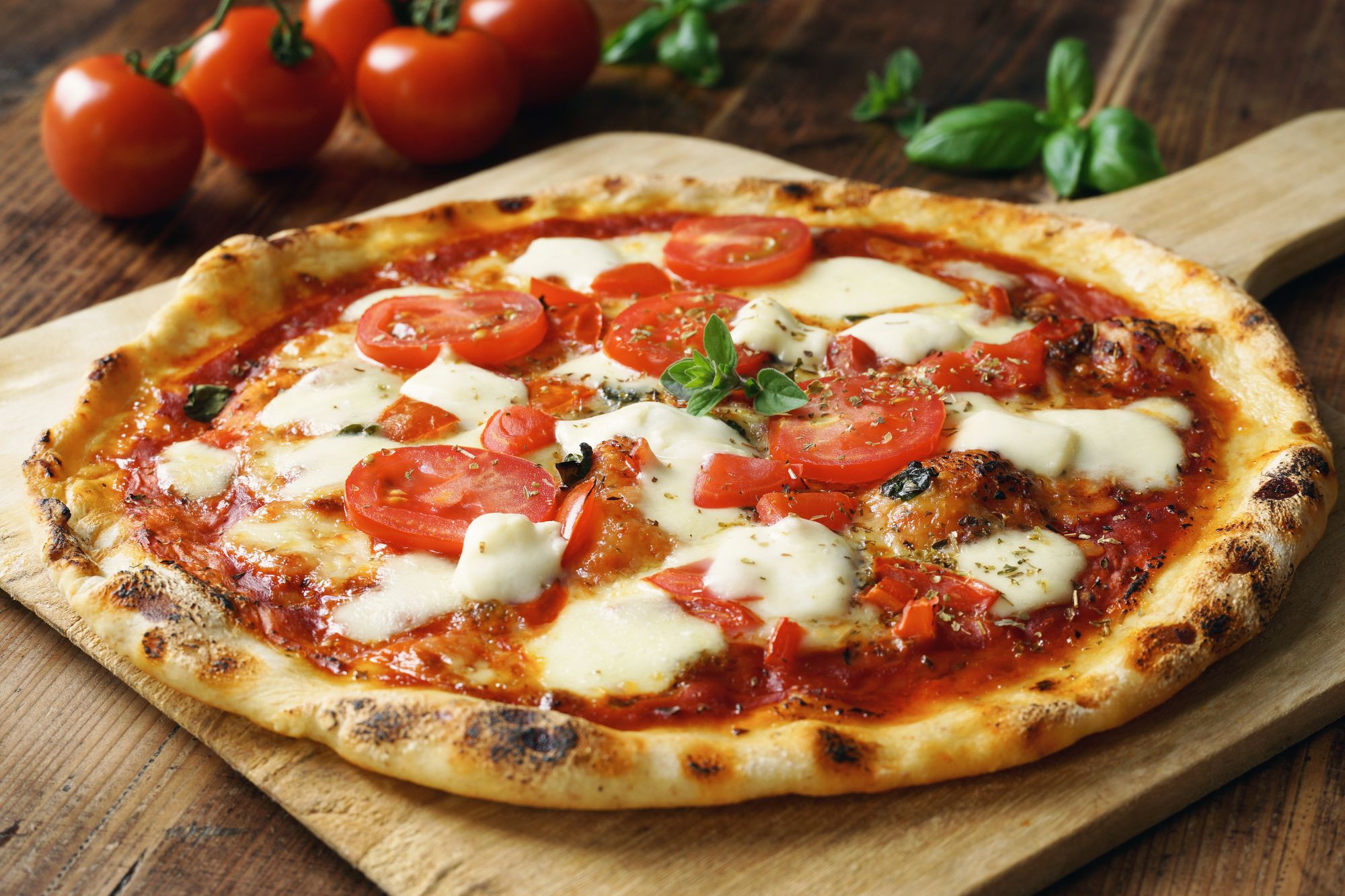
Fast food options like hamburgers and pizza, which are typically high in salt, fat, and calories, can increase stress hormones in the body. According to Sony Sherpa, MD, a holistic physician from Nature's Rise, high-fat dairy products can also be stressors that add extra fat and calories to the diet without providing sufficient nutritional value.
Dr. Sherpa emphasizes that recognizing unhealthy eating habits can contribute to the psychological stress of self-criticism. To avoid stress-induced weight gain, consider making healthier food choices that are lower in salt, fat, and calories. By prioritizing foods that are rich in essential nutrients, you can improve your overall health and reduce the risk of stress-induced weight gain.

